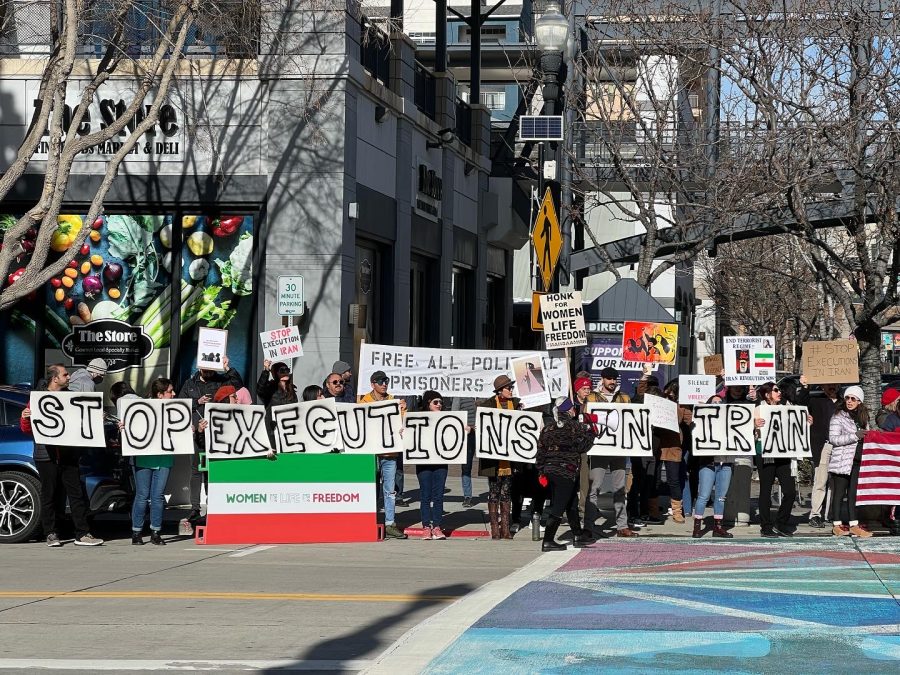Buening: ‘None of Us are Free Until All of Us are Free’ — Solidarity With the Iranian Freedom Movement
Demonstrators protest against the executions in Iran at The Gateway in Salt Lake City on Jan. 7, 2023. The demonstration was organized by FreeIranSLC because two protesters were executed by the Islamic Regime that day. (Photo courtesy of the Persian Students Association)
March 7, 2023
On Sept. 16, 2022, Mahsa Amini — a 22-year-old Iranian woman — died in the custody of the Islamic Regime’s “morality police” after being arrested for “allegedly violating laws requiring women to wear a headscarf,” according to the Wall Street Journal. The tragedy sparked protests within Iran as crowds burned headscarves, vandalized symbols of the regime and clashed with authorities. But the inhumanity didn’t end. Instead, the regime brutally escalated its violence against protestors and citizens alike. And in the months since, Iranians have witnessed a myriad of horrors, from mysterious disappearances to public executions and death sentences.
No matter their efforts, however, the country’s leadership cannot silence the will of their people.
Alborz Ghandehari, an assistant professor of Ethnic Studies at the University of Utah, noted that this is the “latest uprising” in a “century-long struggle among Iranians for freedom from authoritarianism and oppression.” A multitude of Iranians living across the world feel the weight of this struggle, and a large community of them have landed in Salt Lake City and at the U.
The U has a responsibility to amplify the voices of its Iranian students and faculty by supporting the efforts of its Persian Student Association. Joined with the efforts of FreeIranSLC and The Iranian American Society of Utah, Utahns must do more to raise awareness and build solidarity with the Iranian freedom movement.
Strengthen One Movement, Strengthen Them All
People from all walks of life have risen to support Iran. Standing up against the policing of women’s bodies by the state requires huge effort, especially when the state aggressively represses those rights. The movement encompasses more than women’s rights, too.
Iran is an ethnically diverse country, and the movement is also “about fighting ethnic discrimination alongside gender discrimination,” according to Ghandehari. Economic justice also factors in, with some unions and workers in the country striking in solidarity.
We’ve seen similar causes of justice echoed globally — like how people in the U.S. became “galvanized to step up the fight for gender equality” after the fall of Roe v. Wade, as Ghandehari put it. We’re in the midst of a global movement for gender equality, and as we stand for it here, we should stand powerfully for it in Iran.
This by no means entails pushing for foreign intervention by the U.S., though. “The movement in Iran is not asking for that,” Ghandehari said.
Instead, they’re asking for “international solidarity from people at the grassroots.” We must remember, he added, that “none of us are free until all of us are free.” Connecting our movements can create a better future for all our interconnected communities, but that starts with lifting up the voices of the affected.
Grief at the U
Iranians at the U deserve our support now more than ever. Ghandehari, whose family comes from Iran, said that “not a day goes by where I’m not thinking about my loved ones in Iran and their safety.”
Likewise, Yasamin Shaker, a third-year Ph.D. student in the sociology department, expressed feeling a sense of “survivor’s guilt” being away from her loved ones in Iran. While she recognizes that it’s harder for people to care about issues that don’t impact them personally, she described feeling as though her efforts to support movements here weren’t always reciprocated. Iranians make up the majority of attendees at local “free Iran” rallies, but they could always use more of our support.
Mahan Fakouri, a second-year Ph.D. student in electrical engineering, spoke to the immense responsibility that falls upon Iranians outside of the country. Because people within Iran face danger and are prohibited in their access to the outside world, he said it’s his and others’ responsibility to be the “voice of the people inside the country.”
No one should carry such grief and burden alone. Feelings of hopelessness and loneliness pervade, appeased only by the creation of community and solidarity.
Prioritizing Community and Solidarity
Two years ago, Fakouri and his friends formed the Persian Student Association as a space for Iranian students to gather and create social connections on campus. Now, the association tries to share information on the revolution and organize rallies. But importantly, it allows the community a way to share their grief and express their emotions. Cultural expression is instrumental in this endeavor, as Shaker and Ghandehari can attest.
Ghandehari pointed to Iranian culture as a rich source from which to draw “strength, resilience and hope,” and Shaker has turned to artistic expression for “healing, grieving and imagining a better future.”
The U needs to do all it can to assist in building up community — cultural and otherwise. PERSA, Fakouri described, is limited in what it can do politically because of the U’s bylaws, but that doesn’t mean the university shouldn’t condemn the Islamic Regime’s actions. After all, if our institution is the kind of champion of education that it claims to be, it should stand with the hundreds of Iranian students who have been jailed or exempted from continuing their studies.
Revolution, Fakouri said, “happens in the universities and in educated spaces.” The U, and all of us, should embrace that call to action and help embolden Iranian activists everywhere.








